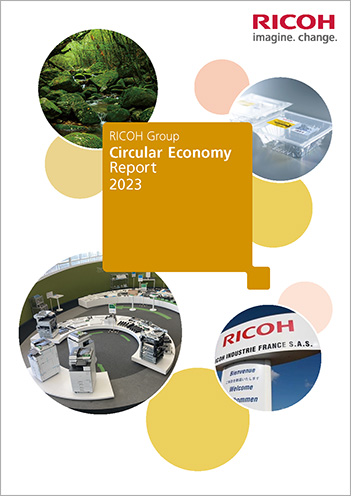- Home
- Sustainability
- Reports on Ricoh's ESG
- Circular Economy Report
Circular Economy Report

Ricoh Group Circular Economy Report
We report on our efforts toward a circular economy. This report summarizes the Ricoh Group’s basic approach to sustainability, its policy for realizing circular economy, and the risks and opportunities for us.
Ricoh Group Circular Economy Report 2023 (32P/5.52MB)
Back Number
Ricoh Group Circular Economy Report 2022(28P/4.63MB)
Ricoh Group Circular Economy Report 2021(28P/6.74MB)
Ricoh’s initiatives towards a Circular Economy
In the Ricoh Group Circular Economy Report 2023, we report on our efforts toward a circular economy referring to the “Disclosure and Engagement Guidance to accelerate Sustainable Finance for a Circular Economy” issued by METI (Ministry of Economy, Trade and Industry of Japan) and MOE (Ministry of the Environment), based on information disclosure from such sources as our website and the Ricoh Group Integrated Report. This report summarizes the Ricoh Group’s basic approach to sustainability, its policy for realizing circular economy, and the risks and opportunities for us, and it gives examples of our countermeasures and initiatives.
Interest in the “Circular Economy” is increasing due to resource depletion caused by global population growth and the issues of marine plastic litter. Business models that do not depend on resource consumption are becoming more important. In a 2019 report issued by the Ellen MacArthur Foundation in the United Kingdom, which promotes the circular economy, renewable energy and energy utilization efficiency only address 55% of all greenhouse gas emissions. The report states that it is necessary to circulate the manufacture and use of products to address the remaining 45% of all greenhouse gas emissions.
In 1994, the Ricoh Group established the “Comet Circle™” as a concept for realizing a circular economy. In line with the concept of the comet circle, we have promoted the effective life cycle use of resources and have been promoting efforts toward the realization of a circular economy for many years. We have realized the commercialization of recycled products and parts, and we have acquired many technologies and much know-how necessary for this. In 2009, we set mid- to long-term goals to reduce the use of virgin material. In 2020, we established the Ricoh Group Plastic policy, with its targets and goals. To achieve the goals, we will provide products and services that meet the demands of society while promoting the 3Rs (reduce, reuse, and recycle) and long-term use of products, expanding the use of recycled plastics, and accelerating the reduction of virgin plastics derived from fossil resources.
In the future, the importance of the circular economy will receive greater recognition, and the flow from ownership to use will accelerate. However, efforts toward the realization of a circular economy are very hard challenges for one company alone, so it is necessary to evolve in collaboration with other companies and organizations. We will continue to create new businesses that not only further expand our reuse and recycling business, but also contribute to the transition to a circular economy in various industries by developing our own technologies in, for example, optics, imaging, materials, manufacturing, and control systems. Based on the comet circle concept, we will continue to provide new services and technologies that contribute to a circular economy that is beneficial for all our stakeholders.